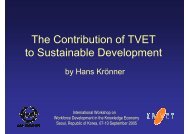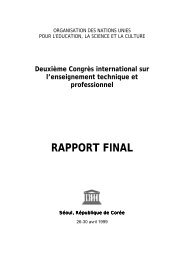Learning for Life, Work and the Future Initial ... - Unesco-Unevoc
Learning for Life, Work and the Future Initial ... - Unesco-Unevoc
Learning for Life, Work and the Future Initial ... - Unesco-Unevoc
You also want an ePaper? Increase the reach of your titles
YUMPU automatically turns print PDFs into web optimized ePapers that Google loves.
Page 40 Participants’ Papers <strong>Learning</strong> <strong>for</strong> <strong>Life</strong>, <strong>Work</strong> <strong>and</strong> <strong>the</strong> <strong>Future</strong><br />
achievement of <strong>the</strong> project aim as outlined under<br />
‘Purpose of ZOSS’ above.<br />
Experiences, Problems <strong>and</strong> Achievements<br />
Since its inception in May 1999, ZOSS has developed<br />
<strong>and</strong> piloted structures, systems, concepts <strong>and</strong> procedures<br />
on <strong>the</strong> development of occupational st<strong>and</strong>ards<br />
<strong>and</strong> <strong>the</strong>ir utilisation. The experiences, problems <strong>and</strong><br />
achievements have provided <strong>the</strong> project with in<strong>for</strong>mation<br />
<strong>and</strong> expertise which are invaluable to o<strong>the</strong>r<br />
countries in <strong>the</strong> region that have already commenced,<br />
or intend to commence, developing <strong>and</strong> implementing<br />
st<strong>and</strong>ards-based <strong>and</strong> competency-based education <strong>and</strong><br />
training.<br />
ZOSS is willing <strong>and</strong> committed to <strong>the</strong> sharing of its<br />
experiences, products, procedures <strong>and</strong> technical<br />
expertise with all countries in <strong>the</strong> region.<br />
Project Policy, Organisation <strong>and</strong> Management<br />
ZOSS was efficiently initiated using interim existing<br />
statutory industry-government policy <strong>and</strong> organisational<br />
structures <strong>and</strong> systems. The implementation of<br />
<strong>the</strong> ZOSS pilot project was delegated to NAMACO by<br />
MoHET, <strong>and</strong> <strong>the</strong> joint MoHET-NAMACO meeting<br />
became <strong>the</strong> policy-making body. The use of this<br />
existing policy <strong>and</strong> organisational decision-making<br />
framework provided <strong>the</strong> opportunity <strong>for</strong> <strong>the</strong> gradual,<br />
pragmatic, cost-effective <strong>and</strong> flexible development <strong>and</strong><br />
emergence of permanent policy, organisational, conceptual<br />
<strong>and</strong> technical structures, systems <strong>and</strong> procedures.<br />
The development of <strong>the</strong> infrastructure, systems<br />
<strong>and</strong> procedures required to develop <strong>and</strong> implement this<br />
occupational st<strong>and</strong>ards framework can only be done<br />
effectively <strong>and</strong> efficiently if it is based on pragmatic<br />
<strong>and</strong> meaningful experiences ra<strong>the</strong>r than on <strong>the</strong>oretical<br />
dispensation.<br />
NAMACO fur<strong>the</strong>r delegated <strong>the</strong> management of <strong>the</strong><br />
project to a multi-stakeholder task team consisting of<br />
representatives of <strong>the</strong> following key stakeholders at<br />
executive <strong>and</strong> decision-making levels:<br />
• EMCOZ<br />
• CZI<br />
• MoHET<br />
• Ministry of Labour<br />
• Ministry of Education, Sports <strong>and</strong> Culture<br />
• ZNCC<br />
• ZCTU<br />
• NAMACO<br />
• Private training providers<br />
• Public training providers<br />
• National, regional <strong>and</strong> international high-level<br />
personalities.<br />
The project is co-sponsored by ZIMDEF <strong>and</strong> GTZ.<br />
All members of <strong>the</strong> task team are nominated by <strong>the</strong>ir<br />
constituencies, <strong>the</strong>reby enhancing stakeholder participation,<br />
buy-in <strong>and</strong> <strong>the</strong> transparency of all discussions<br />
<strong>and</strong> decision-making. ZOSS is now in <strong>the</strong> process of<br />
recommending <strong>the</strong> establishment of permanent organisational<br />
structures based on <strong>the</strong> practical experiences<br />
of <strong>the</strong> pilot project.<br />
The utilisation of existing structures <strong>and</strong> <strong>the</strong> gradual<br />
dem<strong>and</strong>-driven development of permanent structures<br />
based on a piloted <strong>and</strong> tested working concept is a<br />
cost-effective organisational development strategy.<br />
In many countries elaborate, expensive <strong>and</strong> inefficient<br />
organisational structures are established be<strong>for</strong>e <strong>the</strong><br />
development of a pragmatic working concept. This has<br />
resulted in <strong>the</strong> common so-called “white elephant”<br />
syndrome. Adequate piloting <strong>and</strong> testing of concepts<br />
<strong>and</strong> procedures provides <strong>the</strong> practical experience <strong>and</strong><br />
expertise required to develop <strong>and</strong> establish appropriate<br />
<strong>and</strong> responsive policy, organisation <strong>and</strong> management<br />
structures <strong>and</strong> systems.<br />
Regional <strong>and</strong> International Networks<br />
The national networking discussed above is complemented<br />
by <strong>the</strong> establishment <strong>and</strong> development of<br />
regional <strong>and</strong> international linkages <strong>and</strong> networks; <strong>the</strong>se<br />
facilitate <strong>the</strong> development of concepts, procedures,<br />
products, structures <strong>and</strong> systems of <strong>the</strong> highest international<br />
st<strong>and</strong>ards in order to meet <strong>the</strong> ZOSS vision of<br />
becoming <strong>the</strong> regional centre of excellence on <strong>the</strong><br />
development <strong>and</strong> utilisation of occupational st<strong>and</strong>ards<br />
using DACUM. The GTZ NVTD Programme has<br />
provided <strong>the</strong> project with <strong>the</strong> required technical assistance<br />
<strong>and</strong> support through <strong>the</strong> financing <strong>and</strong> provision<br />
of high-quality consultancy services. This support<br />
includes:<br />
• Provision of long-term technical advisory <strong>and</strong> consultancy<br />
services through INBAS, a German consultant<br />
company with wide <strong>and</strong> varied experience,<br />
<strong>and</strong> exposure to DACUM, CBET, <strong>and</strong> education,<br />
training <strong>and</strong> labour market research <strong>and</strong> development.<br />
• Provision of short-term consultancy services by<br />
SQA through a memor<strong>and</strong>um of underst<strong>and</strong>ing<br />
signed between MoHET, GTZ, NAMACO <strong>and</strong><br />
SQA.<br />
• Provision of local consultancy <strong>and</strong> o<strong>the</strong>r support<br />
services.<br />
• Facilitation <strong>and</strong> financing of regional <strong>and</strong> international<br />
visits/workshops, exposure <strong>and</strong> networking.





